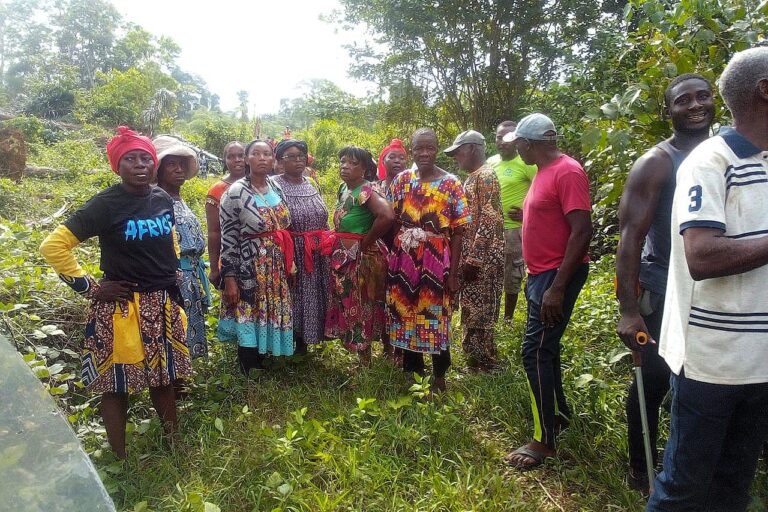- The Philippines has banned new open-pit gold, copper and silver mines, Secretary of Environment and Natural Resources Regina Lopez announced April 27.
- Lopez cited the need to protect biodiversity, evidence of injuries to communities and water supplies, and violations of environmental law by the mining industry.
- Since taking office in July, Lopez has lauched an aggressive campaign to force the mining industry to improve its practices.
- The ban could be one of Lopez’s last acts in office; on May 3, she faces review from a legislative committee that includes people linked to the mining industry.
QUEZON CITY, Philippines — Prompted by powerful evidence of massive injury to communities and water supplies, and findings of rampant violations of environmental law, the Philippines has banned new open-pit gold, copper, nickel, and silver mines.
The order to block any more open-pit metal mines in the Philippines comes a month after El Salvador became the world’s first country to ban all metal mining.
“We have suffered long enough,” said Regina Lopez, the Philippine secretary of the environment, who announced the ban during a news conference here on April 27. “What are we doing? This goes against everything, everything that God wants. People are suffering so much. The Earth is suffering. It’s wrong. And it will stop.”
The Chamber of Mines of the Philippines, the industry’s influential trade group, did not respond to a request for an interview for this article. But Ronald S. Recidoro, the chamber’s vice president for legal and policy, told the Business Mirror newspaper that the ban was “absurd” and “biased” against the mining industry. “It did not undergo any study,” he said.
The order to prevent new open-pit mines does not affect quarries and the country’s sole open-pit coal mine. It was issued in the tenth month of an aggressive campaign by Lopez to force the Philippines mining industry to improve its practices and adhere to environmental law. On her first day in office last July, Lopez launched teams of compliance auditors to investigate how well the country’s 40 big mines were following regulations to protect water quality and ensure the safety of communities and the land.

In February, with the audit findings in hand, Lopez cancelled or suspended the mining licenses of 26 mines. She sent two more companies “show cause” letters that asked them justify why their operations should be allowed to continue. All but a handful of the companies appealed for relief directly to President Rodrigo Duterte. While the appeals are being considered, the mines continue to operate.
Lopez also cancelled agreements between the government and mining companies for 75 mines that were proposed to be built in some of the country’s most beautiful watersheds. Lopez’s orders appear to halt some $8 billion to $10 billlon in mine proposals, including the $ 5.9 billion Tampakan open-pit copper and gold mine in Mindanao.
Lopez made it clear from her first days in office that she opposed the Tampakan project. It would force hundreds of people off their land, she said, damage water and ruin a magnificent tropical watershed. “Water is life,” Lopez said on Thursday. “Is it right to let this go on? Is any amount of money worth it? Is this right? We need love. Love is courage. The courage to stand up for what is true.”
The order to outlaw new open-pit mines could very well be Lopez’s last as environment secretary. Next week a 25-member legislative committee that reviews cabinet appointments is scheduled to vote on approving or dismissing Lopez from her post. The committee includes a number of members that are heavily supported by mining companies. The family of the committee’s vice-chairman owns a big metal mine.

The struggle over metal mining in the Philippines has been especially fierce since 1995, when the country approved a mining statute that opened the country’s extensive gold, copper, and nickel reserves, among the world’s largest, to international development companies. The intent was to encourage foreign investment and new jobs.
The next year, though, Filipinos discovered just how environmentally risky an anticipated boom in open-pit mineral mining could be. On March 24, 1996 a tailings pond breached at the Marcopper open-pit copper mine on Marinduque, an island southeast of Manila. Millions of tons of toxic mine sludge roared down the Boac River, flooding communities, wrecking the river and contaminating the sea 27 kilometers (16.7 miles) away. The Canadian company closed the mine. It is now one of the 14 abandoned open-pit mines in the Philippines that are surrounded by acres of bare and eroded hillsides and big pools of toxic acidic water contaminated with high concentrations of heavy metals.
In August 2012, an even bigger tailings disaster followed torrential rains at the Philex copper and gold mine in Benguet, about 315 kilometers north of Manila. Some 20 million tons of mine tailings poured from the breached tailings pond and into nearby streams.
Lopez says her mining orders are meant to prevent any more damage from big new mines. “We have the most unique biodiversity on the planet,” she said in an interview. “We are the center of the center of marine biodiversity of the entire planet in the Verde Passage. It’s a passage through the islands. It’s beautiful and so clean. They want to put up a gold mine there. So I cancelled it. Hello? It’s cancelled.”
Keith Schneider is an international correspondent specializing in global trends related to water, energy, and food. Based in northern Michigan, he has reported from six continents. Read his blog at ModeShift.org and reach him on Twitter @modeshift.
FEEDBACK: Use this form to send a message to the author of this post. If you want to post a public comment, you can do that at the bottom of the page.














